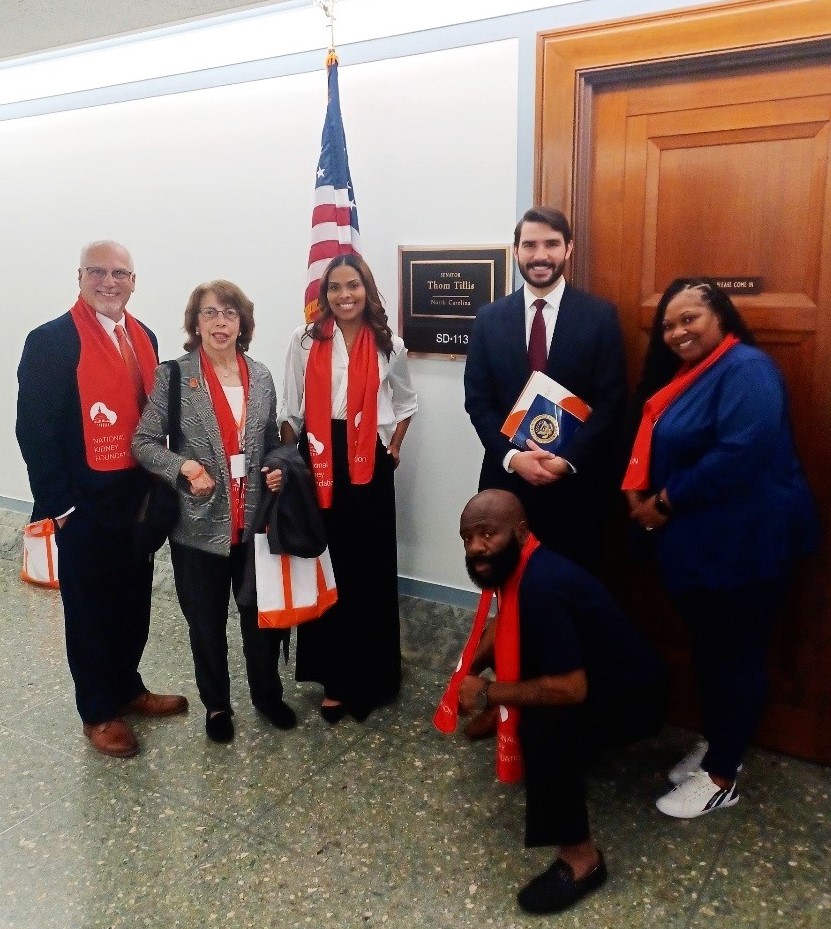I just figured out that I’ve now participated in more than thirty advocacy (aka lobbying) meetings for the kidney community, mostly at the federal level. My recent meetings in DC for the National Kidney Foundation’s Kidney Patient Summit definitely stand out. I thought I’d share some observations.
At their worst–perish the thought!–such meetings risk being dry, one-sided recitations of our “asks” (often cosponsoring legislation, signing on to a letter, voting to increase research funding) while a well-meaning but harried staffer listens quietly, taking notes, followed by our rushed awkward efforts to “tell our stories” before the staffer, obviously distracted by more pressing obligations, moves to end the meeting early.
Fortunately, the only ones I’ve ever had that were close to that scenario occurred years ago on Zoom, because of COVID, often without video. (I kept hoping that the disembodied voice was more engaged than it sounded and wishing desperately for a little eye contact to have a better idea if our message was “getting through.”)
At their best, though, such as one our North Carolina team had recently with a seasoned Senate staffer, Garrett Daniel (Senator Thom Tillis’s legislative assistant), they can be exhilarating. Here are a few illustrations.
Instead of being one sided, they’re natural interactive conversations that happily go off script. I’d been in several excellent Zoom meetings with Garrett since 2020, but this was our first in-person meeting. He’s always engaged, well informed, and often alludes to other ideas in the senator’s pipeline–such as a plan for a framework for paid leave for caregivers–that dovetail with our efforts.

We all participated in the lively discussion, often, in response to his questions, mentioning additional aspects of our asks that we hadn’t touched on in our elevator pitch. After hearing comments from a kidney transplant recipient’s wife, Garrett was the one to raise the subject of the burden on the caregiver not just in the home but in terms of job issues.
He listened to our personal stories and then often gently asked questions to get a clearer picture of what our experiences entailed. In fact, when he prompted one of our team members to elaborate on her long journey to get a kidney transplant, she shared important and wrenching details that the rest of us hadn’t heard.
Because her insurance company would only cover her numerous appointments for essential tests if she went to a center three hours each way from her home in Charlotte–instead of one just fifteen minutes away–she had to wait more than two years before she could move ahead with the transplant she desperately needed. Then, after she went through all her testing and was just one test away from being listed for a transplant, she got a peritonitis infection–so the transplant was further delayed.
At the end of the meeting, in addition to concern, Garrett also offered critical pragmatic support. For example, Senator Tillis is already a cosponsor of the Living Donor Protection Act, so our ask in his case was to help us get a committee hearing for the bill. Garrett’s boss is not on one of the committees in question, so Garrett offered to reach out to his counterparts in the office of NC Senator Budd (who is) to bolster our efforts. He planned to do the same with other offices regarding another bill the kidney community is supporting, to help expand access to home dialysis.
It was late afternoon when we left the office, and in between meetings we’d been walking up and down long, imposing corridors and all over Capitol Hill for hours. Our feet hurt. But after meetings like this, everyone on our team left feeling energized.
For related posts and information on my book, The Insider’s Guide to Living Kidney Donation, be sure to explore the rest of my website.